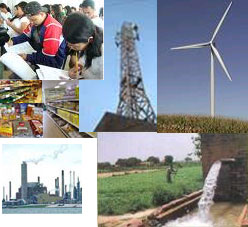UN sees India’s growth slowing to 4.8% in 2013
19 Dec 2013
United Nations has lowered India's economic growth forecast for 2013 to 4.8 per cent, from its earlier forecast of 5.1 per cent and has warned emerging market economies of the possible negative impact of a tapering of the US Federal Reserve's quantitative easing programme.
 The UN's World Economic Situation and Prospects 2014 report lowered India's economic growth forecast by 1.3 per cent for 2013, while it pegged India's growth rate down 1.2 per cent at 5.3 per cent in 2014.
The UN's World Economic Situation and Prospects 2014 report lowered India's economic growth forecast by 1.3 per cent for 2013, while it pegged India's growth rate down 1.2 per cent at 5.3 per cent in 2014.
The UN report projects India's economic growth at by 5.7 per cent in 2015.
"In China, growth was expected to maintain a pace of about 7.5 per cent over the next few years, while India's economy was forecast to grow by more than 5 per cent," the UN report said.
Growth in South Asia remains lacklustre as a combination of internal and external factors hamper activity, particularly in the region's largest economies, such as India, it said.
The global economy is expected to expand by 3.0 per cent in 2014 and by 3.3 per cent in 2015, compared with estimated growth of 2.1 per cent for 2013, according to the 'World Economic Situation and Prospects 2014' report preview launched on Wednesday.
''The world economy experienced subdued growth for a second year in 2013, but some improvements in the last quarter have led to the UN's more positive forecast,'' said the UN Department of Economic and Social Affairs and the UN Conference on Trade and Development (UNCTAD).
The predictions are based on an end to the euro's protracted recession and somewhat stronger growth in the United States, according to a UN release.
In the US, fiscal tightening and a series of political gridlocks over budgetary issues impacted growth, but the trajectory is expected to increase 2.5 per cent in 2014.
Meanwhile, Western Europe remains weak despite emerging from recession. Fiscal austerity and unemployment are expected to remain ''elevated,'' according to the report, with predicted growth of 1.5 per cent in 2014 – similarly to the forecasted growth for that year in Japan.
Large emerging economies, including China and India, succeeding in managing deceleration despite seeing some lowest growth figures in two decades, the report noted, which will be made available in full on 20 January.
''Our forecast is made in the context of many uncertainties and risks coming from possible policy missteps as well as non-economic factors that could stymie growth,'' said Shamshad Akhtar, UN assistant secretary-general for economic development.
The risks include a ''possible bumpy exit'' from the US Federal Reserve's quantitative easing (QE) stimulus bond-buying programme, started in 2008, which is under discussion by the Fed's central policy-making body this week in Washington DC.
''A premature exit of the QE could trigger financial turbulence and derail economic recovery,'' Pingfan Hong, chief of global economic monitoring unit at DESA told journalists in New York.
A pull-out could lead to a surge in long-term interest rates in developed and developing countries. It could also lead to a sell-off in global equity markets, a sharp decline of capital inflows to emerging economies and a spike in the risk premium for external financing in emerging economies.
On the other hand, keeping the QE for too long could make a future exit even more difficult.
Central banks are just ''waiting on a tiger's back difficult to manage a safe dismount,'' said Hong, who is the UN team leader for the report.
Given the complexity and variety of such challenges, the report calls for stronger international policy cooperation and coordination.


















